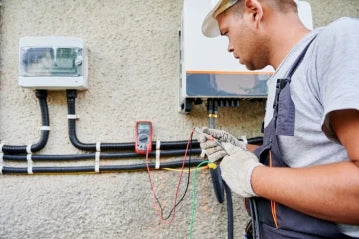
Welcome, eco-conscious homeowners and renewable energy enthusiasts! If you're considering making the switch to solar power, you're on the right path towards a greener and more sustainable future. One crucial component of a residential solar power system is the solar inverter. In this blog post, we'll guide you through the process of choosing the ideal solar inverter for your home, ensuring that you make an informed decision for maximum energy efficiency and savings.
Understanding Solar Inverters
Let's start with the basics. Solar inverters play a crucial role in converting the direct current (DC) generated by your solar panels into alternating current (AC) usable for your home's electrical appliances. There are three main types of solar inverters: String Inverters, Microinverters, and Power Optimizers.
String Inverters: These are the traditional choice, connecting multiple solar panels in a string to a single inverter. Though cost-effective, shading or malfunctions in one panel can affect the entire string.
Microinverters: Unlike string inverters, micro inverters are installed individually behind each solar panel, ensuring optimal performance even if some panels are shaded or dirty.
Power Optimizers: These work in tandem with string inverters, providing individual panel optimization while still benefiting from centralized inverters.
Assessing Your Solar Power Needs
Before diving into the inverter selection process, it's vital to evaluate your energy needs. Look at your current energy consumption, consider any future changes (such as adding electric vehicles or home expansion), and determine your system's size accordingly. This assessment will help you calculate the ideal inverter capacity and ensure your solar inverter meets your energy goals.
Efficiency and Performance
When searching for the perfect solar inverter, efficiency matters. A highly efficient inverter ensures that you get the most out of your solar panels, translating to greater energy production and faster ROI. Pay attention to inverter performance specifications, including efficiency ratings, to make an informed choice and optimize your solar energy output.
Reliability and Durability
Your solar inverter is designed to last for decades, so selecting a reliable and durable model is essential. Check the warranty terms and conditions, customer feedback, and expert ratings to assess the inverter's reliability. A reliable solar inverter will contribute to the long-term success of your solar power system.
Inverter Monitoring and Connectivity
In today's interconnected world, monitoring your solar system's performance remotely is essential. Opt for solar inverters that offer monitoring systems with internet connectivity. This way, you can keep track of your energy production and troubleshoot any issues even from your smartphone or laptop.
Compatibility with Solar Panels
The compatibility between your solar panels and inverter is crucial for optimal performance. Ensure that your chosen inverter can handle the power output of your panels and has multiple Maximum Power Point Tracking (MPPT) trackers. This feature allows the inverter to adjust to varying panel conditions and maximize energy production, especially in situations with partial shading.
Budget Considerations
While we all want the best for our homes, budget constraints are a reality for most of us. Finding the right balance between cost and quality is crucial when selecting a solar inverter. Keep in mind that investing in a more efficient and reliable inverter might lead to greater long-term savings and benefits.
Brand Reputation and Customer Support
As with any significant purchase, doing some research on reputable manufacturers is essential. Go for well-established brands with a proven track record in the solar industry. Additionally, consider the level of customer support and warranty services they offer. Having a reliable company backing your solar inverter ensures peace of mind and assistance whenever needed.
Government Regulations and Incentives
Before finalizing your decision, familiarize yourself with local solar regulations and grid connection requirements. This knowledge will help ensure you adhere to safety standards and certifications. Furthermore, look into potential financial incentives and rebates for installing solar inverters, as these incentives could significantly reduce your overall investment.
Conclusion
Congratulations on taking the first step towards a greener and more sustainable future with solar energy! Remember, choosing the right solar inverter is paramount to the success of your home solar power system. By understanding your energy needs, focusing on efficiency and reliability, and considering factors like monitoring capabilities and brand reputation, you can make an informed decision that will benefit your home and the environment for years to come. Embrace the power of the sun and unlock the full potential of solar energy with the perfect solar inverter for your home. Happy solar shopping!



0 Kommentare